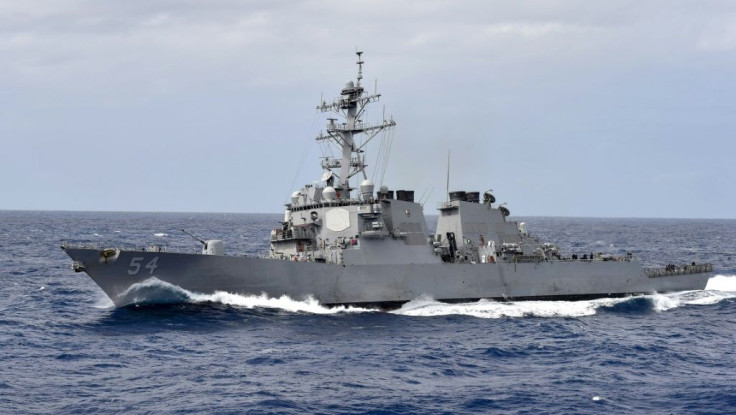South China Sea Tensions: Blinken Delivers A Clear Warning To China, US Warship Sails Near Disputed Island
KEY POINTS
- Blinken reaffirmed the U.S. stance which rejected China's maritime claims in the waterway
- The guided-missile destroyer USS Benfold sailed near a Chinese-controlled island
- China warned the warship to leave or "bear all consequences"
China's ambitions in the South China Sea suffered another setback Sunday as the Biden administration reaffirmed a Trump-era rejection of Beijing's territorial claims in the South China Sea.
Upholding the 2016 ruling by the Permanent Court of Arbitration at the Hague in favor of the Philippines, Secretary of State Antony Blinken said the U.S. would continue to defend the Philippines' armed forces from attack in the South China Sea, reported Associated Press.
This comes as Beijing continues to intimidate the Philippines in the disputed waterway. The relations between the two countries soured after Chinese militia boats stationed themselves in Whitsun Reef, which comes under the Exclusive Economic Zone of the Philippines.
Blinken's statement marks the fifth anniversary of the ruling. Last year, the then Secretary of State Mike Pompeo upheld the tribunal ruling while officially rejecting Chinese maritime claims in the South China Sea. He also called out China for its attempt to intimidate its Southeast Asian neighbors into ceding their interests.
Blinken's words echoed the same. "Nowhere is the rules-based maritime order under greater threat than in the South China Sea," Blinken said. He accused China of continuing "to coerce and intimidate Southeast Asian coastal states, threatening freedom of navigation in this critical global throughway."
Blinken also referred to Pompeo's original statement. "The United States reaffirms its July 13, 2020 policy regarding maritime claims in the South China Sea. We also reaffirm that an armed attack on Philippine armed forces, public vessels, or aircraft in the South China Sea would invoke U.S. mutual defense commitments," he added.
He also urged Beijing to "abide by its obligations under international law (and) cease its provocative behavior" in the South China Sea.
Soon after, the U.S. reiterated its stance on "freedom of navigation" by sending the warship USS Benfold to the region, reports CNN.
The guided-missile destroyer performed a freedom-of-navigation operation (FONOP) near the Paracel Islands in the northwestern part of the South China Sea Monday. The island is currently under Chinese control through Vietnam and Taiwan too raises claims to it.
"This freedom of navigation operation ... upheld the rights, freedoms, and lawful uses of the sea recognized in international law by challenging the unlawful restrictions on innocent passage imposed by China, Taiwan, and Vietnam and also by challenging China's claim to strait baselines enclosing the Paracel Islands," U.S. Navy spokesperson Lt. Mark Langford said in a statement.
However, the destroyer's presence in the region has irked China which claims to have warned the ship to leave the vicinity of the disputed islands or "bear all consequences," reported the South China Morning Post.
"This is another ironclad evidence of the US' aggressive navigational hegemony and militarization of the South China Sea," PLA Air Force Col. Tian Junli, spokesperson for the PLA's Southern Theater Command, said in a statement. "Facts show that the United States is an out-and-out 'South China Sea security risk maker,'" Tian said.

© Copyright IBTimes 2025. All rights reserved.





















